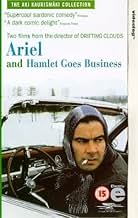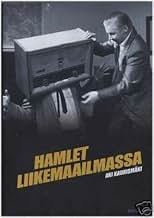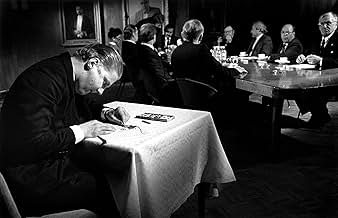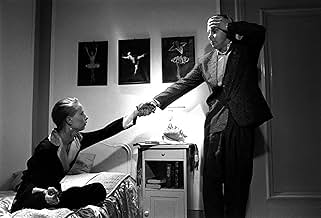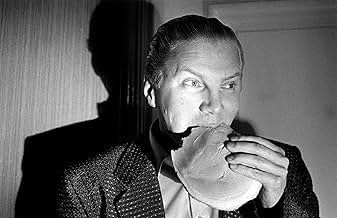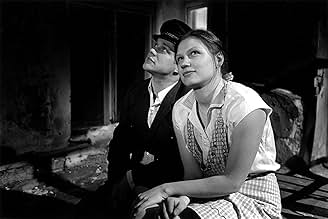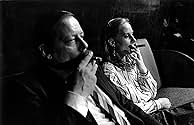Adicionar um enredo no seu idiomaPlayboy Hamlet sees the ghost of his father, a paper baron in today's Finland.Playboy Hamlet sees the ghost of his father, a paper baron in today's Finland.Playboy Hamlet sees the ghost of his father, a paper baron in today's Finland.
- Direção
- Roteiristas
- Artistas
- Prêmios
- 1 vitória no total
- Simo
- (as Hannu Valtonen)
- Direção
- Roteiristas
- Elenco e equipe completos
- Produção, bilheteria e muito mais no IMDbPro
Avaliações em destaque
In Aki Kaurismäki's version, the Kingdom of Denmark is a big Finnish factory (today we would call it a corporation, but the film was made before the Nokia era) that is run by the Hamlet dynasty, and is in danger of being taken over by a Swedish concern interested in in producing there ... rubber ducklings. The dramatic structure of the play is preserved, the hero's father is assassinated, his uncle and mother get married after a short time and plan to take over the kingdom ... sorry, the factory. The ghost appears, and the young heir Hamlet, until then more concerned with bringing the attractive Ophelia to bed, begins to plan revenge. Spectators will recognize many of the plays' lines, a theatrical performance will also appear, although the famous 'To be or not to be' is missing. This Hamlet has no philosophical pretensions but retains some of the ambiguity of the character.
The cinematography gives this film a special quality. Kaurismäki and cinematographer Timo Salminen use black and white but also specific 'film noir' angles as well as cinematic props from Orson Welles and Alfred Hitchcock's sets of tools. The actor who playes Hamlet, Pirkka-Pekka Petelius reminds the young Welles, while Kati Outinen's Ophelia seems to be borrowed from Ingmar Bergman's films. Music and other elements of pop culture combined with the style of gangster story present an original combination, which predates by almost a decade the first films of this genre made by Tarantino and the Coen brothers. With this 1987 film, Kaurismäki started to conquer the position of first-rate director of his generation, and created a version of 'Hamlet' that is like no other.
All of the main scenes from Shakespeare's play are present here, though sometimes (like the murder of Polonius) they don't make much sense in the context of the adaptation and are shown briefly to simply telegraph them. The dialogue is mainly original, though at times it switches into the traditional Finnish translation of Shakespeare's Elizabethan English to deliberately bizarre effect. There is however a laugh-out-loud twist ending going beyond the Shakespearean source material, which turns the film into a commentary on Finnish politics and labor relations.
All of Kaurismäki's films are dark comedies, though with humor so deadpan it is sometimes easy for an audience to miss it entirely. Riffing on the image of the Finnish people as taciturn and emotionless, Kaurismäki's actors are directed to state their lines in a very dry, robotic fashion. The death of Ophelia, a tragedy for the ages, is depicted here in a humorous way entirely due to Kati Outinen's deft facial expression and an unusual prop I won't spoil here. Kaurismäki's love of early rock 'n' roll and blues is present in all of his movies, and you can also expect to see a jukebox kicked into life here and a band performing on stage at some point.
While I am a fan of Kaurismäki and have seen nearly all of his many films, I don't think this is one of his major efforts. The black and white photography is a weak point. Kaurismäki loves utterly drab scenery and it is a big part of his aesthetic, but paradoxically color is necessary to bring this drabness across. It also feels like this is just one more adaptation of Hamlet, even if it's an unusual one, and none of the characters are as readily likable as in Kaurismäki's own original work. Most audiences will find his preceding effort VARJOJA PARATIISISSA (Shadows in Paradise) or his following film ARIEL to be more charming and visually seductive.
Actually, it's more of a black comedy, similarly to Calamari Union (coincidentally, or maybe not, both films were shot in black and white), Kaurismäki's satire on Finnish lowlife. This time, the target is the big industry, within which Hamlet (Pirkka-Pekka Petelius, who also played one of the Franks in Calamari Union) is raised a spoiled brat, spending his days doing mostly nothing, bar flirt with Ofelia (Kati Outinen), whose father (Esko Nikkari) is an important business associate of Hamlet's dad. Then suddenly the situation changes, as the old man is found dead and his brother, Klaus (Esko Salminen) takes over everything, including the marital duties with Hamlet's mother (Elina Salo). Our grief-struck hero is subsequently forced into action after discovering Klaus isn't that innocent: he poisoned his own brother. Hence the inevitable questions: what should Hamlet do? Leave the murderer alone or avenge his father's assassination? In short, to be or not to be?
Ironically, we never hear the protagonist say those words, or the rest of the soliloquy, for that matter. Kaurismäki cut the entire speech because according to him it was ridiculous, useless and distracting, a waste of time: Hamlet would be too busy to start reflecting on life's meaning.
Apart from that (and a few tweaks at the end), Hamlet Goes Business follows Shakespeare's text very closely, albeit with the satirical tone. In fact, the movie's sole weakness is the fact that it gets a little too overblown and surreal come the conclusion, with set-pieces that are funny, yes, but slightly inappropriate in this kind of film.
That said, the film is worth a viewing, if you're open-minded enough. If not, stick with Laurence Olivier or Kenneth Branagh: at least you'll get to hear the famous soliloquy.
The basic story of the film retains the set-up and characters familiar from Shakespeare's adaptation, though with a number of separate abstractions beyond those presented by the general updating of the characters and text. For example, rather than being the noble prince, Kaurismäki's Hamlet is a spoilt, oafish brat; more likely to be getting a hankering for a midnight feast and failing to score with his girlfriend Ofelia than prospering in the cut-throat world of business. In our introduction to the character, a nonplussed Hamlet literally stumbles across the body of his murdered father whilst precociously munching on a large slice of ham. Later in the film, as his step-father and mother conspire to take control of the business, a childlike Hamlet is placated in the boardroom by the addition of his own table with colouring books and felt-tip pens. As a work of satire, both on the idea of industry and on the nuts-and-bolts of Shakespeare's text, Kaurismäki is merciless. However, the film also impresses on a purely stylistic level; with the director adapting certain visual quirks and techniques familiar from post war B-cinema alongside his usual stylistic preoccupations to create one of the greatest pop-cinema pastiches since Godard's Pierrot le fou (1965).
As ever with the films of Kaurismäki, Hamlet works as a result of the perfect casting, with a fantastic performance from lead actor Pirkka-Pekka Petelius complimenting Kaurismäki's regular troop of supporting actors, here including Esko Salminen, Kati Outinen, Esko Nikkari, Turo Pajala and Matti Pellonpää. Petelius's Hamlet maintains that typically straight-faced approach shared by many of Kaurismäki's iconic characters, whilst also possessing something of a childlike innocence to set-up the mechanics for that blistering final act. I can certainly see why some viewers would find the more freely adapted elements of the film offensive on a historical level - with Hamlet here recast as a sulky teen bumbling into a conspiracy that he doesn't quite comprehend - but I think it's important to look beyond the presentation of the character found in the more recognisable elements of the Shakespearean piece to see the bold and imaginative use of satire and stark sense of humour that Kaurismäki brings to the project.
The final act of the film is incredibly funny and filled with imaginative and inventive elements that demonstrate what a fantastic and highly original filmmaker Kaurismäki is; with a film like Hamlet Goes Business, not to mention subsequent highlights like Ariel (1988), I Hired a Contract Killer (1991) and The Man Without a Past (2002) showing the range and talent of a sadly underrated artist very much the equal to the more widely acclaimed likes of Tarantino and the Coen Brothers. Here, Kaurismäki's film takes the pop references and retrogressive elements of the former and mixes it with the intelligence and humour of the latter to produce an exceptional film that is unique to his particular style and approach. Although the humour might prove to be a little too dry, or the style too eccentric to appeal to those with a broader cinematic taste, Hamlet Goes Business is really an absolute joy that is worth experiencing. A bold, irreverent, imaginative and impeccably acted satire, with great black and white cinematography, a jarring style and a great central performance from Petelius.
Você sabia?
- CuriosidadesThe script was written in a very loose form and according to Aki Kaurismäki he only read Hamlet on the very week he wrote the script just a couple of weeks before filming.
- Citações
Gertrud: [Hamlet is discussing with his mother] What I am going to say now is not just a whim. You'll understand if you just want to. I loved your father as much as you can demand a good wife to love a tyrant who never returns love, giving you as much passion as he gives to the winter tires of his car.
Hamlet: I ask you not to tarnish my father's memory.
Gertrud: I've been silent too long to gloss over the facts.
Gertrud: Then get to the point.
Gertrud: I'm going to marry Klaus. I love him.
- ConexõesEdited from Melrose: Rich Little Bitch (1987)
- Trilhas sonorasSymphony No. 11 in G minor, Op. 103
Composed by Dmitri Shostakovich
Principais escolhas
Detalhes
- Data de lançamento
- País de origem
- Idioma
- Também conhecido como
- Hamlet Goes Business
- Locações de filme
- Abrahaminkatu 1-5, Helsinque, Finlândia(former University of Technology)
- Empresa de produção
- Consulte mais créditos da empresa na IMDbPro
- Tempo de duração
- 1 h 29 min(89 min)
- Cor
- Mixagem de som
- Proporção
- 1.85 : 1

